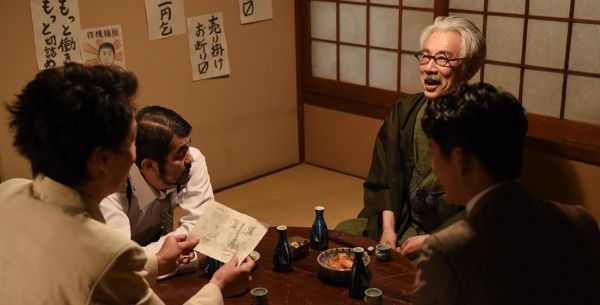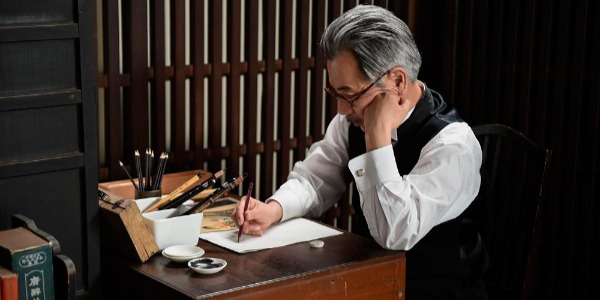Tokyo International Film Festival: THE MANGA MASTER: The Anatomy Of A Disappointing Biopic

Tynan loves nagging all his friends to watch classic movies…
Anyone who has seen even a handful of biopics knows the onus already laden on the genre. I will stop short of saying this cross-section of movies is universally maligned, there are a lot of intriguing people in this world with worthwhile stories to be told, yet sometimes these tales still get tedious.
Often it comes from translating a complicated life full of nuances into a cinematic framework and a mode of storytelling more easily consumed by an audience. Here we run the risk of everything feeling cookie cutter in nature. In other words, a story about John Nash starts looking like a story of Stephen Hawking, which starts looking like the life of Alan Turing. It always takes new perspectives, individual flourishes, and singular performances to make the written word into something wholly unique.
The other problem is the simple fact that if you have a luminary, how is a movie attempting to venerate them, even going to stand up to their already noteworthy name? Very rarely are such pieces able to add significant depth to our appreciation for said individual. Often they lack the time and admittedly the ingenuity to do their subject justice.
Meeting the Master
In the case of The Manga Master, we have a man before us of great magnitude in the history of Japanese popular culture. His name is Rakuten Kitazawa and he is credited with developing “manga” in the modern sense of the word. Issei Ogata (known to American audiences for Silence) gives us glimpses of a quirky creative with touches of his former genius. After all, he was once the man who captivated all Japan with his editorial cartoons and drawings in eminent publications such as Jiji Shimpo and then Tokyo Puck.
His greatest achievement was distilling socio-economic commentary into pictorials to be ingested and understood intuitively by the masses. Because his work comes with an obvious artistry of both image and paired with implication. Obviously, this has fascinating implications for international relations and yes, even propaganda.
While the topic is immediately promising, the execution is more of a rudderless slog. There are charming instances but nothing here has teeth to it or any type of true thematic resonance. It is a pity because Manga Master‘s concept had my mind racing in all sorts of intriguing directions. Ironically, the movie is not able to succeed in the same manner Rakuten did over his illustrious career.

My best points of immediate comparison are Hitchc*ck and Trumbo, two Hollywood biopics which exhibit what feels to be a similar tone within the content. It becomes immediately apparent in the near-caricatures who are brought to the fore as the story opens during WWII. The eminent artist has been put in charge of a Japanese manga association to support the war effort. Afterward, he is flattered by a group of up-and-coming cartoonists who really have little respect for his antiquated ways. Their drinking session is another bit of oddly comic buffoonery.
Perhaps this light tone makes sense given a story about the birth of modern manga, but as Rakuten sits before a member of the national censorship board to offer his advice, there is an inkling that some interesting commentary might be teased out of the situation.
Missed Opportunities
I was preparing myself to compare the use of manga by the Japanese to the propaganda methods of Joseph Goebbels during the Nazi reign or Theodore Geisel (later known as Dr. Seuss) drawing political cartoons often negatively portraying the Japanese. Because when you think about it, comics like movies themselves are a very colloquial and highly effective way to impact the masses. It would be a fascinating point of juxtaposition. Yet again, we get only a cursory dialogue on these matters, nothing truly substantive.
Manga Master eventually uses this as a framework for the heralded sensei to look back at his life intermittently and this is where it suffers most severely from structural problems. Because what’s lacking here is clearly incisive intent.
Some of the best biopics take a microscope to a famous person’s life. Young Mr. Lincoln is about one court case in the 16th president’s early career. Lincoln occupies itself with the monumental passing of the 13th amendment. But they both allow for greater depth and analyses of a character within a manageable context.

Initially, it seems like the movie might function in this way with our protagonist as an old man looking back on a life. Imagine our surprise when this nostalgic flashback takes up a brunt of his story. Mind you, this not inherently bad but there seems to be little call for it. He’s not a Salieri-type fuming over a lifelong rivalry from his old age with some amount of lingering hatred or philosophical musings to look back on.
Nor is it framed quite like the biopics of George M. Cohan or Jake LaMotta. While those stories are fairly expansive in nature (like this one), part of what makes them truly electric are the lead performances from the likes of James Cagney and Robert De Niro. They play each man from youth to old age and we stick with them in awe.
We have hopes Issei Ogata will be destined for something spectacular in his own right and yet we spend almost more time with his younger self than we do with him. It’s by no means to downplay the somewhat callow turn by his alter ego, but it does rather disrupt our expectations. Furthermore, it peeves me slightly Rakuten’s wife remained all but unchanged throughout the picture while he ages so drastically two actors were called upon to play him. It’s one of a handful of objections I have.
The Manga Master: Airing Grievances
It’s true my own ignorance as a non-native Japanese means I have no recognition of all these various creators and people of import in the early 20th-century manga landscape. However, knowing real-life folks in a story like this doesn’t necessarily make them more appealing.
To call on Hitchc*ck and Trumbo again, seeing little-known-actors portraying famous historical figures like a Bernard Herrmann or an Edgar G. Robinson almost demystifies them more. I imagine it might be much the same with Rakuten’s contemporaries here. They lose any mythical mystique they might still have brought to life as they are.
It’s true the picture also features some animated sequences which seem fitting given the subject matter but even these elements come at us out of the blue. There is no consistent thread running through the picture and when the live-action gets disrupted by animated characters it feels like precisely that — an unwanted disruption — when it should really be a fitting accent.
Manga Master commits one final error (though it’s probably done quite purposefully). As the credits roll, Ogata is walking his dog in the foreground wearing his traditional attire, except the people coming towards him don’t look right. One is jogging in athletic clothes and could it be another is carrying a cell phone? He has obviously shattered the cinematic realm and is in our reality.
It’s akin to Peter Sellers breaking out in laughter during the outtake credits of Being There. No illusion is left for us to enjoy. It gets ripped away even before the picture is over. If The Manga Master was actually a cohesive effort, it might be more of a tragedy.
What are some of the biopics that are most powerful for you? What specific elements make them ring true?
The Manga Master was screened on October 28th and October 30th of the 2018 Tokyo International Film Festival.
Does content like this matter to you?
Become a Member and support film journalism. Unlock access to all of Film Inquiry`s great articles. Join a community of like-minded readers who are passionate about cinema - get access to our private members Network, give back to independent filmmakers, and more.
Tynan loves nagging all his friends to watch classic movies with him. Follow his frequent musings at Film Inquiry and on his blog 4 Star Films. Soli Deo Gloria.













